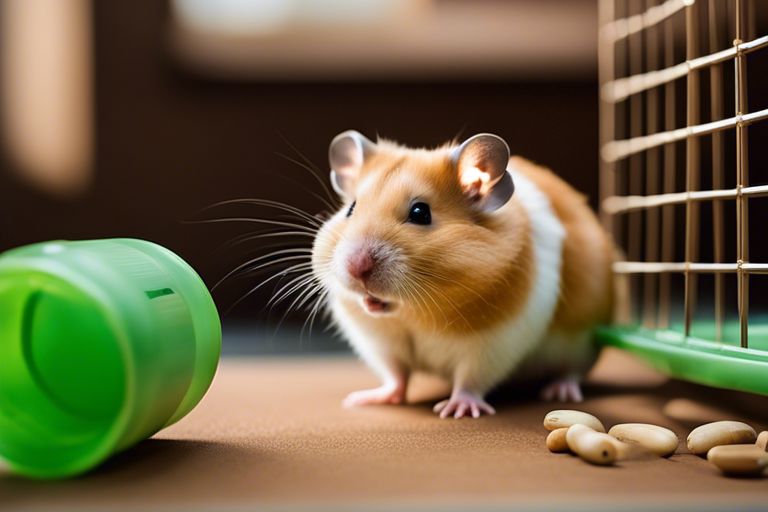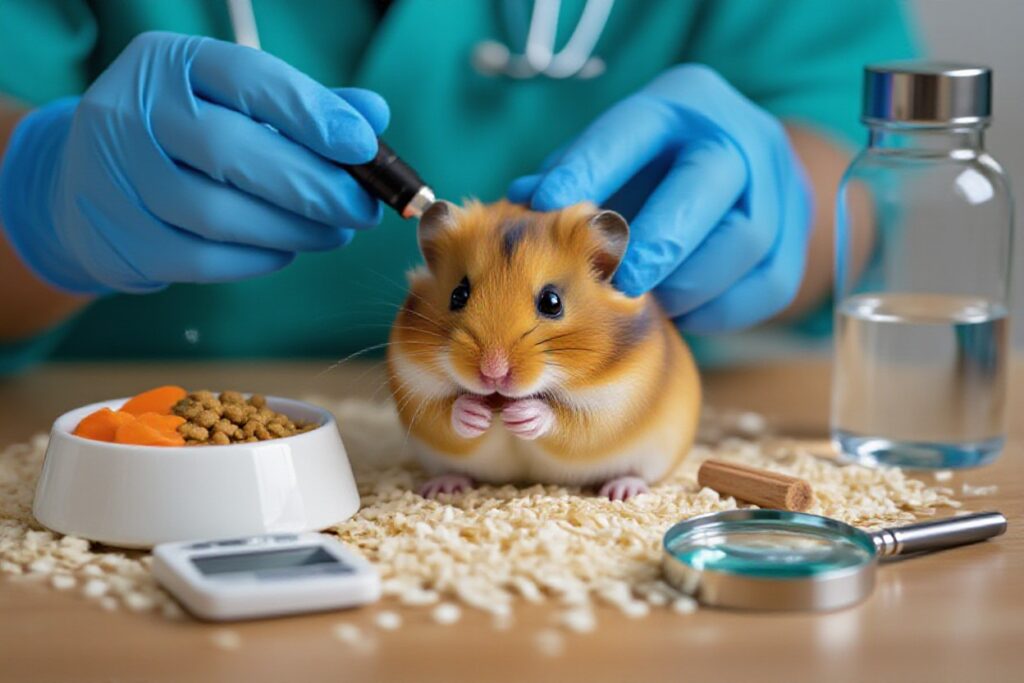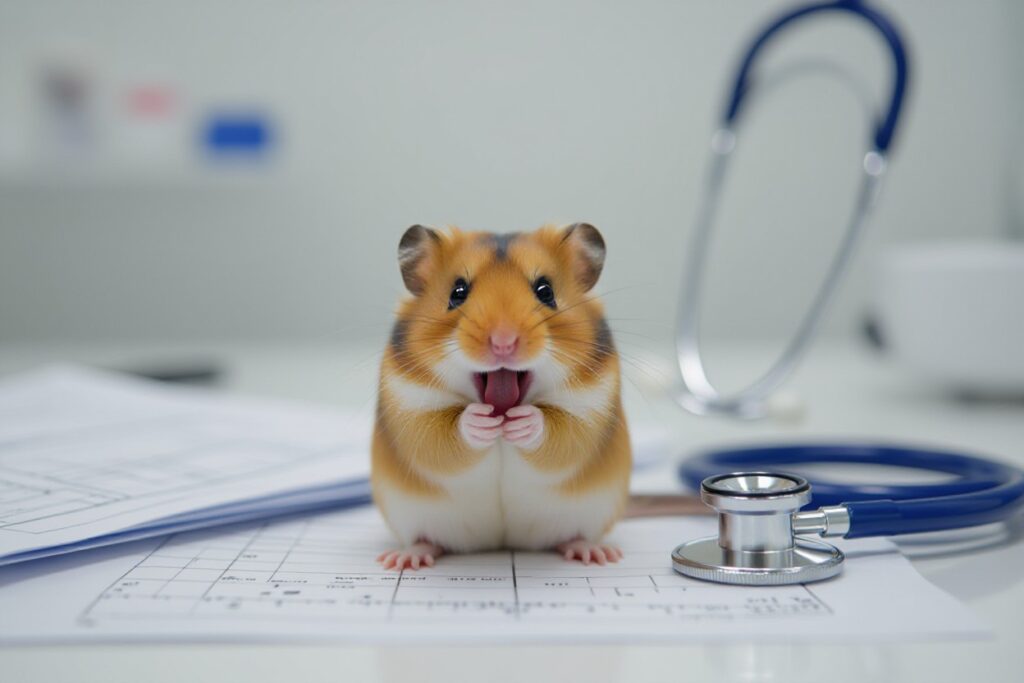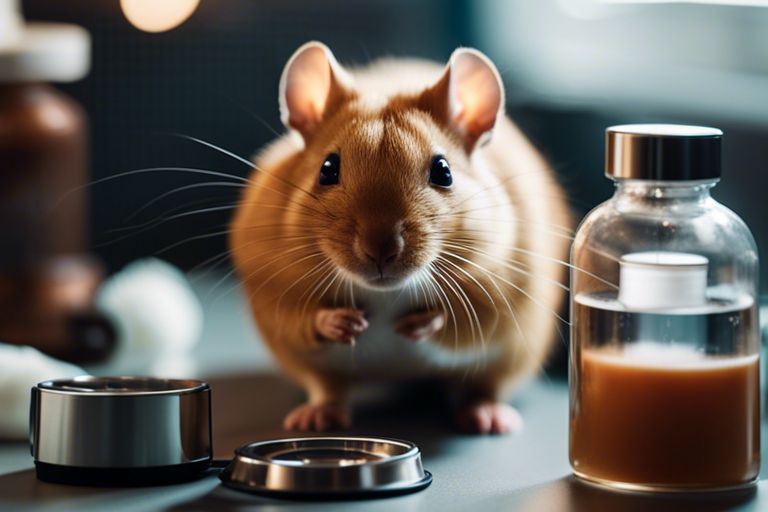Just like any other pet, hamsters require proper care and attention to thrive in a home environment. Whether you’re a first-time owner or a seasoned hamster enthusiast, understanding these imperative facts about caring for your furry friend is crucial for their health and happiness. Let’s examine into the key points that every hamster owner should know in order to provide the best possible care for these adorable rodents.
Suitable Housing Provision
Spacious cage needed
While hamsters are small pets, they require ample space in their cages to move around and exercise. A spacious cage is necessary for your hamster’s physical and mental well-being. Make sure the cage you choose is large enough to accommodate exercise wheels, tunnels, and toys, while still providing enough room for your hamster to explore and play.
Avoid wire-bottom cages
Clearly, wire-bottom cages are not suitable for hamsters. The wires can not only injure their tiny feet but also cause stress and discomfort. Opt for a cage with a solid bottom to ensure your hamster’s safety and comfort. A solid substrate, like paper bedding or aspen shavings, should be used to cover the cage floor and provide a soft surface for your hamster to walk on.
To further prevent injuries and promote your hamster’s overall well-being, provide plenty of bedding material in the cage to allow for burrowing and nesting. Hamsters love to dig and create cozy sleeping areas, so ensure they have enough substrate to engage in these natural behaviors.
Appropriate Diet Required
Balanced hamster food mix
Any hamster owner knows that providing a balanced diet is imperative for the health and well-being of these tiny pets. A high-quality commercial hamster food mix should be the staple of their diet. Look for a mix that includes seeds, grains, and pellets to ensure your hamster receives all the necessary nutrients for optimal health. Avoid mixes with added sugars or artificial colors, as these can be harmful to your furry friend.
Fresh vegetables periodically
An important component of a hamster’s diet is fresh vegetables. Periodically offering small amounts of leafy greens like spinach, broccoli, or carrots can provide additional vitamins and minerals to their diet. However, it’s crucial to introduce new vegetables gradually to prevent digestive upset. Always wash and chop the vegetables into small, bite-sized pieces to make them easier for your hamster to eat.
Hamsters have sensitive digestive systems, so it’s imperative to monitor their reaction to new foods. If you notice any signs of diarrhea or discomfort, remove the vegetable from their diet and consult with a veterinarian if the issues persist.
Any sudden changes in their diet can lead to digestive issues, so take your time when introducing fresh vegetables into their meal plan. Be mindful of, a well-balanced diet is key to keeping your hamster happy and healthy for years to come.
Essential Clean Water
Constant fresh water availability
Clean and fresh water should be made available to your hamster at all times. Ensure there is a water bottle attached to their cage that is easy for them to access. Hamsters can become dehydrated quickly, so it’s crucial to check their water supply daily.
Daily water bottle check
Any obstruction in the water bottle nozzle can prevent your hamster from accessing water. Make it a habit to check the water bottle daily for any clogs, leaks, or low water levels. It’s imperative to clean the water bottle regularly to prevent bacteria growth and keep your hamster healthy.
This ensures your furry friend always has access to clean water and helps you monitor their water intake, which can be an indicator of their overall health.
Regular Cage Cleaning
Weekly thorough clean
After a week of your hamster enjoying its cozy habitat, it’s time for a thorough cage cleaning. Start by removing your hamster to a secure temporary area. Take out all toys, bedding, and accessories from the cage. Scrub the cage with pet-safe disinfectant, rinse thoroughly, and allow it to air dry completely before putting back the accessories and fresh bedding.
Spot-clean soiled areas
An important part of regular cage maintenance is spot-cleaning soiled areas. Keep an eye out for places where your hamster tends to urinate frequently or spills food. Use a small brush or cloth to clean these areas promptly to prevent odors and maintain a hygienic environment for your pet.
Cleaning these areas not only prevents bad smells but also helps in preventing bacterial growth that can be harmful to your hamster’s health. Make sure to use pet-safe cleaning products and avoid harsh chemicals that can be toxic to your furry friend.
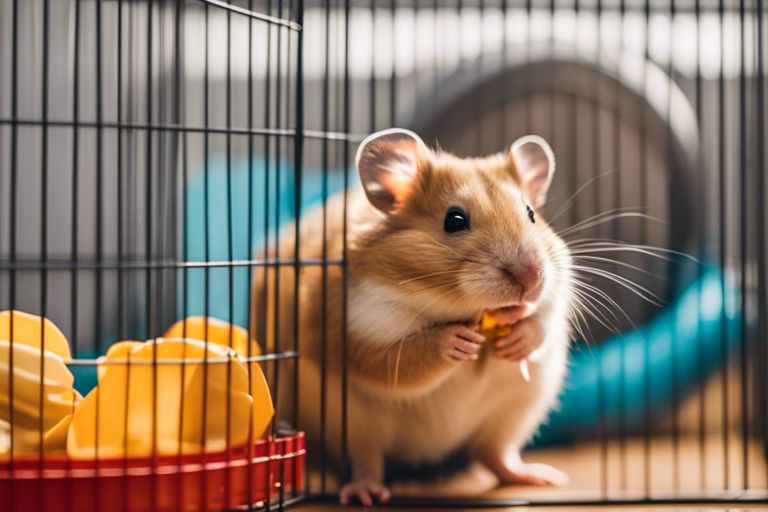
Safe Exercise Opportunities
Provide exercise wheel
Now, one of the vital components for a hamster’s physical activity is an exercise wheel. Hamsters have a natural instinct to run, and providing a wheel will help them get the exercise they need to stay healthy. Make sure to choose a solid-surface wheel to prevent any injuries to their feet.
Supervised play outside cage
Exercise is crucial for hamsters to maintain their physical and mental well-being. Allowing your hamster supervised play outside of their cage is another way to provide them with exercise opportunities. Make sure the area is secure and free of any potential hazards, and always keep a close eye on your hamster to ensure their safety.
Now, when allowing your hamster to play outside of their cage, it’s important to create a safe and secure environment. Make sure there are no small openings where they can escape, remove any toxic plants or household items that they may chew on, and provide them with toys and tunnels to explore and play with.
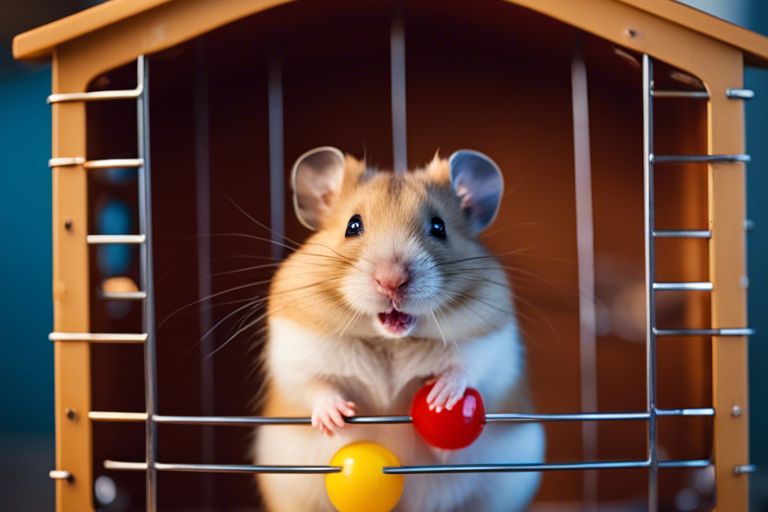
Chew Toy Necessity
Safe chewing material provided
Your hamster’s dental health is crucial, and providing safe chewing material is vital to prevent overgrown teeth. Make sure to offer various chew toys made of safe materials like untreated wood, cardboard, or hard chew toys specifically designed for hamsters. This will help keep their teeth trim and healthy.
Prevent overgrown teeth
For hamsters, chewing is a natural behavior that helps wear down their continuously growing teeth. Without proper chew toys, hamsters can develop overgrown teeth, which can lead to serious health issues. It’s vital to provide them with enough appropriate chewing material to prevent dental problems.
Chew toys not only serve as a dental care tool but also provide mental stimulation for your hamster. By encouraging their natural chewing instincts, you can keep their teeth healthy while promoting overall well-being. Regularly check their chew toys for wear and tear, and replace them when necessary to ensure your hamster’s dental health remains in top condition.
Companionship Considerations
Species-specific social needs
Now, when considering the companionship needs of your hamster, it’s crucial to understand that different species have varying social needs. While some hamsters thrive in pairs or groups, others prefer to live alone.
Solitary vs. social species
You’ll need to research your hamster’s species to determine whether they are solitary or social animals. Syrian hamsters, for example, are solitary by nature and should be housed alone to prevent territorial conflicts. On the other hand, dwarf hamsters are more social and can benefit from having a same-sex companion.
Social hamster species, such as dwarf hamsters, enjoy the company of their own kind and may become stressed or depressed if kept alone. Providing a suitable cage size and resources for multiple hamsters is necessary to ensure their well-being and happiness.
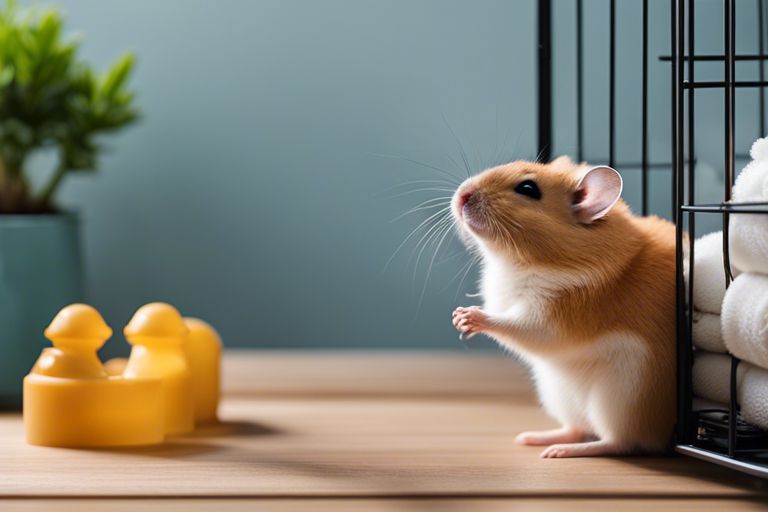
Gentle Handling Important
Regular, calm interaction
Important for hamsters is regular, calm interaction with their owners. This helps them build trust and become more comfortable with being handled. Make sure to handle your hamster gently and create a positive association with human touch by offering treats and speaking softly to them.
Minimize stress during handling
During handling, it is crucial to minimize stress for your hamster. Sudden movements and loud noises can startle them, leading to potential bites or feelings of fear. Handle your hamster in a quiet, calm environment, and be patient as they get used to being held.
This can take time, especially if your hamster is young or new to being handled. Start with short handling sessions and gradually increase the duration as your hamster begins to feel more comfortable. Always watch for signs of stress, such as squeaking or trying to escape, and give your hamster breaks as needed.
Health Monitoring Essential
Notice behavior changes
To ensure the well-being of your hamster, it’s crucial to pay close attention to any changes in their behavior. Hamsters are experts at hiding signs of illness, so any deviations from their normal habits could be a red flag. Look out for decreased activity, changes in appetite, excessive thirst, aggressive behavior, or even hair loss. Keeping a keen eye on these subtle changes can help you detect health issues early on.
Prompt vet visits
Even with diligent observation, some health problems may go unnoticed by untrained eyes. It is crucial to schedule regular check-ups with a veterinarian who specializes in small animals. Hamsters are prone to various health issues, such as respiratory infections, dental problems, and tumors, which require professional diagnosis and treatment. A vet can provide proper care and advice on how to improve your hamster’s health and quality of life.
Health monitoring is an crucial aspect of caring for hamsters. Regularly observing and assessing your hamster’s behavior and physical condition can help ensure prompt detection of any underlying health issues. By staying vigilant and seeking professional veterinary care when needed, you can provide the best possible care for your furry friend.
To wrap up
Taking this into account, it is important to understand the specific needs and requirements of hamsters to ensure their well-being. From providing a suitable habitat with proper bedding and hiding spots to offering a balanced diet and regular exercise, these small pets require attention to detail in their care. Additionally, being aware of common health issues and ensuring proper handling can help prevent potential problems. By following these 10 must-know facts about caring for hamsters, you can create a safe and comfortable environment for your furry friend to thrive in.
FAQ
Q: Why is it important to provide proper nutrition for hamsters?
A: Proper nutrition is crucial for hamsters’ overall health and well-being. A balanced diet helps prevent nutritional deficiencies and ensures your hamster stays healthy and active.
Q: How often should I clean my hamster’s cage?
A: Hamster cages should be cleaned at least once a week. Remove any uneaten food, soiled bedding, and waste to maintain a clean and hygienic living environment for your pet.
Q: Can hamsters be housed together?
A: Syrian hamsters are solitary animals and should be housed alone to prevent fights. Dwarf hamsters can be housed in same-sex pairs or groups, but careful monitoring is required to ensure they get along.
Q: Do hamsters require exercise?
A: Yes, hamsters need regular exercise to stay healthy and prevent obesity. Providing a wheel, tunnels, and toys in their cage encourages physical activity and mental stimulation.
Q: How can I handle my hamster safely?
A: When handling your hamster, do so gently and support their body to prevent them from escaping or falling. Always approach them calmly and avoid sudden movements to build trust and prevent stress.
